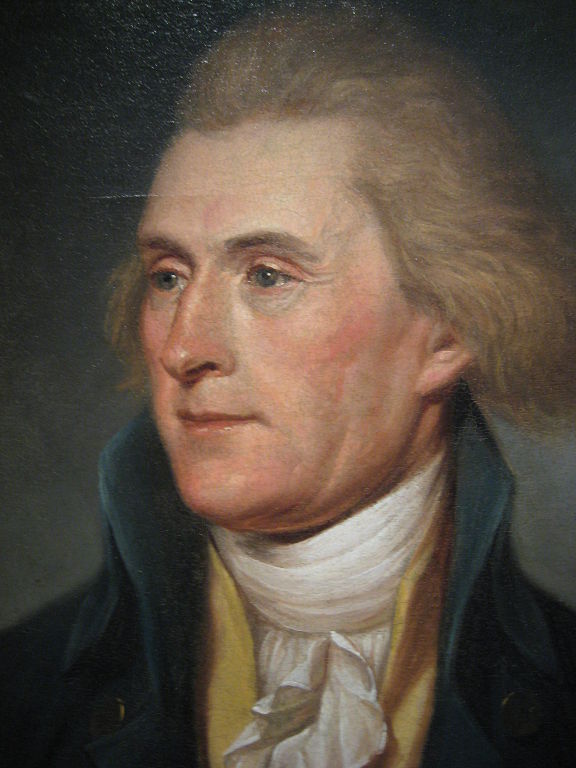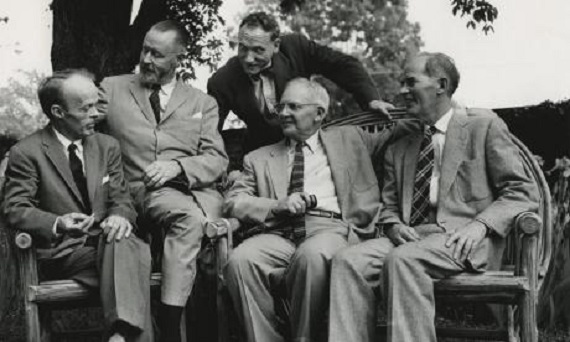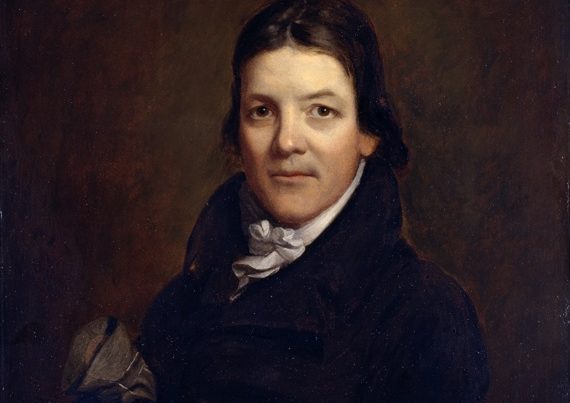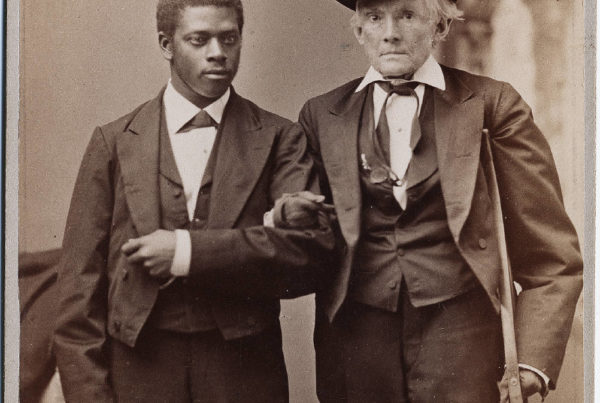In 1809 Thomas Jefferson yielded up the Presidency and crossed into Virginia. In the 17 active years remaining to him he never left it. The first volume of Malone’s masterpiece, published in 1948, was Jefferson the Virginian. The sixth and last is The Sage of Monticello. Jefferson begins and ends with Virginia. Keep this fact in mind. It will save us from many errors and lead us as near to the truth as we can get in regard to this sometimes enigmatic Founding Father.
No great American, not even Lincoln, has been put to so many contradictory uses by later generations of enemies and apologists, and therefore none has undergone so much distortion. In fact, most of what has been asserted about Jefferson in the last hundred years—and even more of what has been implied or assumed about him—is so lacking in context and proportion as to be essentially false. What we commonly see is not Jefferson. It is a strange amalgam or composite in which the misconceptions of each succeeding generation have been combined and recombined until the original is no longer discernible.
Presuming we wish to know Jefferson rather than simply to manipulate his image for our own purposes., Malone is indispensable. Jefferson and His Time is a conspicuous example of an increasingly rare phenomenon, genuine scholarship. I mean that term as a compliment—to denote a work that avoids the extremes of pedantry and superficiality, that is exhaustive, thorough, honest, balanced, felicitous, reasonable, and executed on a noble scale.
From Malone, and especially from the latest volume, we can if we wish, begin to discern the real Jefferson. And that Jefferson is in the broad outline of American history, identifiable in no other way than as a conservative. The real Jefferson is most visible in his last years. I do not mean by this that Jefferson was one of those proverbial persons who was liberal in youth and conservative in old age. There is no conflict between the young Jefferson and the old Jefferson except in the perceptions of image-manipulators. Jefferson was of a piece, his main themes were constant. But I do mean that the conservative Jefferson emerged most clearly in the last years, when he was not in office, when he was not bound by the necessary compromises of leading a party or speaking in the voice of community consensus rather than his own voice, when he was down home in his natural environment.
How did we get so far afield that it has taken half the lifetime of a great historian to recover the wherewithal of a proper understanding of Jefferson? First, New Englanders, embittered by the half-century setback which Jefferson and his friends administered after 1800 to their political style and goals, painted him as an effete snob, a visionary, a kind of squeamish Jacobin. If the New England Federalists and their descendants lacked political power, they made up for it in cultural power. Their loss at the polls was turned into a victory in the sophisticated battleground of historical writing. The understanding of Jefferson and his accomplishments that was handed down to posterity was created by Henry Adams. Adams, with brilliance, painstaking care and a cunningly contrived pseudo-objectivity, structured a perception of Jefferson and his times from which American historians—until Malone—had never really escaped. Jefferson, even when viewed sympathetically, was judged by New England standards. This meant that the essential outlines of his Virginian frame of reference were obliterated. Thus the mainsprings of his belief and action could not be detected accurately.
Jefferson’s admirers have done him little better. It seemed that the Civil War and Federalist historians had repudiated and buried Jefferson forever. Then along came Vernon L. Parrington, the son of an English socialist (but raised in Kansas), who rediscovered Jefferson the agrarian liberal. But unfortunately what Parrington discovered was an imaginary combination of French philosophe and midwestern populist, not the planter of Albemarle County. Parrington. Claude Bowers and a host of other worthies soon turned Jefferson into the patron saint of Wilsonism, the New Deal and what currently passes for liberalism.
Thus, by a strange piling-up of ironies, the intellectual descendants of Jefferson’s opponents converted him into one of them, a kind of urban, liberal, puritan dogmatist of egalitarianism. More recently, some of them, like Fawn Brodie, have discovered that the evidence does not fit this image, that Jefferson never was a certifiable modem liberal. They should have admitted that they had been wrong all along. Instead they chose to brand Jefferson as an aberration and a hypocrite for not being one of them, that is for not being what he never was and never wanted to be. Jefferson was an American republican, not a European social democrat. Jefferson was agrarian, not urban and industrial. Jefferson was a gentleman, which the class of admirers I am talking about here certainly is not.
All of these distorted notions of Jefferson have been possible only because of a lack of context, plausible because they have extrapolated one small portion of Jefferson and built an image on that foundation. This has been most conspicuous in the peculiar, dogmatic, ahistorical rendering of one phrase of the Declaration of Independence as a piece of egalitarian revelation. Indeed, without this one distortion of Jefferson (and of American history) the contemporary American left could hardly be seen to have any legitimate tradition at all. (Even more peculiarly, the same dogma is embraced as a main tenet by one school of “conservative’- political scientists.)
There is one other important reason for misreading Jefferson that must be taken into account. Jefferson can be misunderstood in the same way that any great writer is subject to conflicting interpretations. And Jefferson is important as a writer, a thinker and a stylist. If he had never held public office, the immense body of his private correspondence would still be one of the most important American cultural legacies of his period. In his correspondence he was imaginative, playful, speculative. He adapted himself somewhat to the person he was addressing. He liked to turn ideas around and examine them from all angles. Except in his most narrowly political activities he wrote as a philosopher, not as a tactician. Further, he was intellectually polite and magnanimous. Dogmatists found that Jefferson did not contradict them in person. When they later discovered that he disagreed, they called him a hypocrite. He was not: he was simply a polite listener, a gentleman. Thus Jefferson can be quoted against Jefferson. In order to see clearly the real Jefferson we have to know the context, we have to know the whole corpus of work, we have to know which were the constant themes and which the occasional ones. This Malone has made possible.
Who, then, was the real Jefferson? What were these constant themes? They are clear. None offer comfort to the contemporary left. First of all, Jefferson stood for freedom and enlightenment. That he is our best symbol for these virtuous goals is Malone’s central theme. That does not mean, however, that his thought can be twisted to support something that very different men with very different goals postulate to be freedom and enlightenment. His concepts of freedom and enlightenment were always rooted in the given nature and the necessities of his Virginia community and always balanced harmoniously against competing claims. Read Jefferson on the need for ever)’ citizen to be a soldier, on the prudential limits that should have been observed in the French Revolution, on the inappropriateness of liberty for a people unprepared for it: read of Jefferson’s approval of Governor Patrick Henry’s summary execution of a Tory marauder.
Jefferson favored the liberty of the individual and the community, and he had in mind certain reforms that he felt would enhance them. However, Jefferson was nothing if not the enemy of programmatic, government-imposed reforms. His whole career proved this. But read his reaction to the nationalistic program of our first “progressive” President. John Quincy Adams:
When all government, domestic and foreign, in little as in great things, shall be drawn to Washington as the centre of all power, it will render powerless the checks provided of one government on another, and will become as venal and oppressive as the government from which we have separated.
Jefferson is on record as fearing the harmful effects of slavery on the community. But he feared far more the harmful effects of political antislavery. Read him on the Missouri controversy and you will correct a thousand misrepresentations. Jefferson, it is true, wanted America to be an example to all mankind of successful free government. But when he said example that is just what he meant, example. He gives no comfort to those who want to impose democracy on others, but much comfort to those who want to defend American democracy from any and all enemies. Jefferson, it is true, mistrusted the clergy. In this respect he was typical of his generation. But Jefferson the citizen, as opposed to Jefferson the philosopher, lived within the church. Religion and piety troubled him not at all. What he feared was the sanctimonious, intermeddling, politicized Calvinist clergy—that is, what we would today call ‘”liberal” churchmen.
Jefferson was the advocate of a free economy, but he was not doctrinaire about it. Like all his values, his belief in the free market was balanced against other claims. He believed in economic freedom within a stable society. Malone’s chapter, “The Political Economy of a Country Gentleman,” by simple adherence to the facts, corrects four generations of distortion. When viewed “in retrospect,” he writes, Jefferson’s “reaction to the economic problems of his day can better be described as conservative.”
Jefferson championed public education, but it was not public education on the leveling Prussian-New England model that later became the American standard. The traditional classical curriculum was to be supplemented by more modern and practical subjects, but not jettisoned to make room for them. It was to be an education competitive, elitist, based on a belief in a natural aristocracy of talents and virtues. The rich would always take care of themselves. The purpose of public education was to make sure that the talented ones who appeared among the poor would not be lost. That is the exact opposite of what modern American public education aims at, for its goal is to reduce the educational level to the lowest common denominator—which, in effect, guarantees that the poor but promising youth does not learn enough to rise above his station or to compete with the privileged. “The natural aristocracy,” wrote Jefferson, “I consider as the most precious gift of nature for the instruction, the trusts and government of society. . . . May we not even say that the government is best which provides most effectually for a pure selection of these natural aristoi into the offices of government?”
Dumas Malone has completed a great work—a work that is, like its subject, truthful, harmonious, balanced, fair, decorous, gentlemanly. What a rare thing for an American book in the 20th century, a book by a gentleman about a gentleman.







